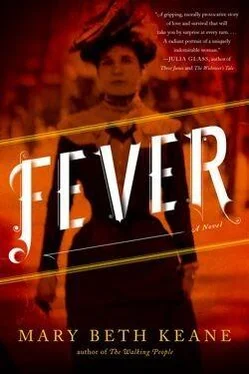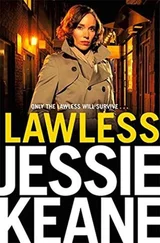“Will you let it go, Mary?”
“No. I don’t understand. You have to tell me.”
“It’s — I don’t know. It’s not a real goddamn army, but they seem to think it is. It’s freezing outside. Every man’s gloves are soaked through by lunch. So I had to keep warm.”
And Mary knew exactly what had happened. He’d gone to work with his flask, kept it in his pocket or his boot, and had sipped himself to warmth while he was working. And one day, he’d sipped too much.
After that he stopped trying to get work altogether and instead went out early in the morning to sit in Nation’s Pub all day long. Mary let it go for a few weeks, reminding herself that men were like cats that needed to lick their wounds for a good long time before going to battle again. And then she stopped letting it go. When he got up and dressed she asked him a dozen times where he was headed and when he finally told her what she already knew, she couldn’t stop herself from flying down the stairs of the building after him, telling him that he’d better wake up, pay attention, life was not something to be frittered away on a barstool, and if he wanted a woman who would mollycoddle such a man he’d better look elsewhere. Alfred had always been a drinker. Since the very first day. But he’d been a drinker like all men were drinkers, a constant slow-paced drinker who walked the ledge easily, and in fact got through the day with more work behind him with the help of a little nip now and again. There was a time when no one could shovel coal like Alfred. No one could lead a pack of horses. No one could lift a piano. And what harm if during a job the men passed a flask and had a laugh and kept going, shoulder to the wheel? But what Alfred had done was work his way to the limit of the ledge to peek at what was below. He edged and edged and finally, inevitably, he tumbled forward.
The moments he came out of it were brief, and slipped by Mary like a breeze on a humid afternoon. One day, he was sound enough to fix the plaster by their window, and even repainted the whole wall. Another time, after Mary mentioned only once that they needed a new mattress, he went out and got one and carried it up six flights on his back. He put it on the bed, made up the sheets, and carried the old mattress down to the curb before Mary came home. “Surprise!” he said, after encouraging her to go lie down and rest after such a long day. She didn’t check her emergency envelope in the closet. She didn’t care. He’d heard her, and acted, and she would not ask a single question and ruin it. Another time, after not coming home for twenty-four hours, he arrived sober, and shaven, and told Mary he was going to take her out for a steak dinner. They’d go to Dolan’s, and after, they’d walk down to Germantown and go to a beer hall. Instead of asking him where he’d been, she suggested they skip Dolan’s and bring their dinner with them to the beer hall so he’d have more time there, more time for him to speak German with his countrymen, and more time for Mary to listen to that choked language coming out of him. He never spoke German at home. He’d never taught her a single word, and sometimes she wondered if that was the key, if that was the thing that hung between them, and if she were only able to understand him in his first language, she’d be able to understand him completely, and they’d be happy, and everything would make sense.
And then he disappeared again for a few days. Twice, Mary spotted him rounding corners in their neighborhood, and worse, heard him mentioned by the neighbors. “When I talked to Alfred yesterday,” one or another of them would say — and Mary would not be able to hear the rest over the blood that rushed to her head. “I can’t live like this,” she said when he came home next, but he just smiled, and hugged her, and told her he missed her, and pulled her toward him until they were hip to hip, and how did he smell so clean when he’d been on a bender? Where did he go wash himself before coming home? More and more she found herself unable to get past that wall of questions. She couldn’t kick sand over that inferno of fury that had started inside her with just one piece of kindling, and then grown with another, then another. When he pulled her toward their bed, she could no longer force her mind to think only of the warm cave of his body, even though she knew things were always better when she did put everything else aside and let him lift her and move her, let him be the Alfred she loved most.
The Fourth of July 1906 saw good Alfred, sober Alfred. He enlisted two other men on the block to go up to East Harlem with him, and together they bought two crates of fireworks, and told as many as they ran into that they would be setting them off at midnight, in the middle of Third Avenue. He referred to it as the annual tradition, though Mary could think of only one other time when he’d ever organized a fireworks show. Down on the street, when midnight came, he’d yelled at everyone to stay the hell back so that no one would get killed. Just as he was about to light the first match he remembered the Borriellos, and their three young boys, and how they wouldn’t want to miss it. “Run up, will you, Mary? See if they’re awake.” He was standing in the middle of the street with a match. Mary and everyone else knew the Borriellos would be awake because who in the city could sleep on such a night? It was the kind of summer night when even the thinnest cotton sheet felt as heavy and stifling as a rough wool blanket. People had taken their pillows to the roofs, to the fire escapes. It was the first unbearable night in a stretch that would last until August, and most of the men had come down in their undershirts. They were all sweating and panting and waiting for the sky to be illuminated.
Mary ran up and pounded on the Borriellos’ door. “The boys,” she said to Mrs. Borriello, who answered by cracking the door half an inch. “Do they want to come down to the street to see? It’ll just be a few minutes. I’ll keep an eye on them.” There was a pause, and Mary thought the door would be shut, but instead it opened wider and two boys stumbled out and raced past Mary in their bare feet. The baby, the three-year-old, struggled to keep up with his brothers. “They worry I’ll change my mind,” said Mrs. Borriello, smiling.
“And you? And Mr. Borriello?” Mary said. “Will you come down?”
“I’ll watch from the window. My husband is on nights.”
“Make sure you watch,” Mary said as she turned and rushed after the boys. “I’ll bring them right up after.”
More people had gathered by the time Mary returned to the street. A ring of children formed an inside circle, closest to Alfred, and behind the children was a larger ring of adults. Mary recognized people she’d seen come and go at the Second Avenue grocer. She recognized a boy and his father from Twenty-Eighth Street. Alfred hollered at all of them to move back, farther, farther, and finally, when he felt everyone was far enough away, he crouched over the box of cylindrical packages, little circles and rockets with their fuses hanging out like tails, and made a selection. Before Mary could tell him to be careful he’d struck the match against a stone and staggered backward, holding up his arms as if the people who waited were a pack of animals who might stampede.
“What happened?” the older Borriello boy said as the crowd watched the small flame travel up the fuse of the first rocket and then fizzle out.
“A dud,” another boy shouted. “Try another!”
Alfred selected another, but the same thing happened. A few of the men stepped forward to confer, and the crowd started getting restless, moving in different directions.
“All right,” Alfred called after a moment. “Problem solved.” Again, he told everyone to move back, again he told everyone to beware, and on the third try, when he touched the match to the fuse, the little ball of fire ate the thin rope in an instant, and the rocket flew with a wild shriek into the sky, above the tenements of Third Avenue, arcing west for a moment before exploding red, white, and blue high over their heads, seeming to cover the whole island of Manhattan. The audience was transfixed, their faces lit, the kids openmouthed, and for the next half hour, until the very last sparkler had died, Mary was proud of him, that he’d done this for all of them, and she remembered why she loved him.
Читать дальше












